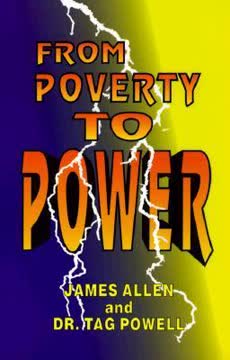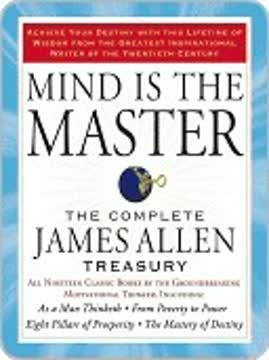Key Takeaways
1. Your Thoughts Shape Your Entire Reality.
Mind is the Master power that moulds and makes, And Man is Mind, and evermore he takes The tool of Thought, and, shaping what he wills, Brings forth a thousand joys, a thousand ills:— He thinks in secret, and it comes to pass: Environment is but his looking-glass.
Internal world first. Your outer life, circumstances, and environment are direct reflections of your inner world of thought. What you harbor in your heart will inevitably manifest in your outward experience. This applies to everything you are and everything that happens to you.
Cause and effect. Just as a plant grows from a seed, every action and condition in your life springs from your thoughts. This is a fundamental law, as absolute in the realm of mind as in the physical world. Noble thoughts lead to a noble character and life, while base thoughts lead to degradation and suffering.
Master your mind. You are not merely a creature of circumstance; you are a creative power. By consciously choosing and directing your thoughts, you become the master-gardener of your mind, weeding out the negative and cultivating the positive. This self-mastery is the key to shaping your character, circumstances, and destiny.
2. Happiness and Suffering Are Born Within You.
Heaven and hell are inward states.
Internal origin. Suffering, pain, sorrow, happiness, and bliss are not externally imposed conditions. They reside solely within your own heart and mind. Your world is colored by your state of consciousness; what you are within is mirrored without.
Self-created purgatory. So long as you believe that others' selfishness is the source of your unhappiness, you remain trapped in a self-created purgatory. True happiness is an inward state of satisfaction, free from the endless clamor of desire, which is the source of all torment.
Beyond possessions. Happiness is not derived from outward possessions, nor misery from the lack of them. Many rich people are miserable, while some poor people are happy. This demonstrates that true well-being depends on your inner state, not your external circumstances.
3. Self-Control Is the Gateway to Power and Peace.
He only is fitted to command and control who has succeeded in commanding and controlling himself.
Master your forces. To be swayed by your fluctuating thoughts and impulses is weakness; to control and direct them is power. Spiritual power comes from mastering your internal mental forces, not from external strength or authority.
Discipline is key. Self-control is the Door of Heaven, leading to light and peace. Without it, you are lost in darkness and unrest. It is the beginning of virtue and leads to every noble attribute, including calmness, blessedness, and peace.
Practice makes perfect. Self-control is not a mystical secret but a practical science found in everyday life. It is cultivated by breaking bad habits, forming good ones, attending to present duties, acting vigorously, living by rule, and controlling your tongue and mind.
4. Purpose and Faith Drive Achievement.
There is nothing that a strong faith and an unflinching purpose may not accomplish.
Focus your energy. Until thought is linked with purpose, intelligent accomplishment is impossible. A central purpose focuses your mental forces, preventing them from being scattered by worries, fears, and self-pity.
Faith overcomes. Faith in an Eternal Good and an over-ruling Justice is the prelude to a triumphant life. Faith bestows courage, fortitude, and steadfastness, enabling you to face difficulties and setbacks not as defeats, but as steps toward greater success.
Action follows belief. The will to do springs from the knowledge that you can do. Doubt and fear are enemies of knowledge and purpose. Conquer doubt and fear, and you conquer failure; your thoughts become allied with power, and difficulties yield before you.
5. Life Operates by Unfailing Cause and Effect.
Whatsoever a man sows that shall he also reap.
Universal law. The law of cause and effect is absolute and unvarying, governing both the physical and moral universe. Every thought and deed is a cause that produces a corresponding effect. This law is eternally balanced and just.
You are the cause. Your circumstances are the inevitable results of your own thoughts and deeds. You choose the cause (your actions), but you cannot choose, alter, or escape the effect (your destiny). Suffering is the effect of wrong thought and action; blessedness is the effect of good thought and action.
Justice prevails. The moral law exists and is not subverted by appearances. The good man who suffers may be reaping past evil, while the bad man who prospers may be reaping past good. Ultimately, each individual receives the just measure of their own sowing.
6. True Prosperity Rests on a Moral Foundation.
Prosperity rests upon a moral foundation.
Beyond money. True prosperity is not merely financial wealth or material possessions. It is a spirit, an attitude of mind, a moral power that manifests outwardly as plenty, happiness, and joy. Financial wealth without moral richness is emptiness.
Eight Pillars. Stable and enduring prosperity is supported by eight moral pillars:
- Energy
- Economy
- Integrity
- System
- Sympathy
- Sincerity
- Impartiality
- Self-reliance
Build your temple. A life built on these principles is like a strong temple, resistant to storms of adversity. While few perfect all eight, cultivating even a few, especially the first four (Energy, Economy, Integrity, System), ensures a measure of enduring success and influence.
7. Difficulties Are Teachers Leading to Wisdom.
Evil, when rightly understood, is found to be, not an unlimited power or principle in the universe, but a passing phase of human experience, and it therefore becomes a teacher to those who are willing to learn.
Lessons for growth. Difficulties, perplexities, and suffering are not arbitrary punishments but necessary experiences for your development. They reveal your weaknesses and ignorance, urging you to summon energy and intelligence to find a better way.
Insight from pain. Every difficulty solved and every suffering endured with patience and understanding adds to your experience, insight, and wisdom. Pain teaches you what not to do, while the conquest of difficulty reveals your latent powers.
Transcending the struggle. When you understand that difficulties arise from your own mental state and lack of insight, you can meet them calmly. By applying dispassionate thought and seeking the lesson within, you transform hindrances into aids and emerge stronger and wiser.
8. Transcending Self Reveals Divine Consciousness.
By the mastery of self, a distinct form of consciousness is evolved which some would call divine.
Beyond the ego. Ordinary human consciousness is self-centered, driven by personal desires and fears. Divine consciousness transcends this, concerning itself with universal truths, righteousness, and wisdom, free from sin and sorrow.
Annihilate the negative. Overcoming self is not destroying your being but annihilating negative elements like lust, hatred, pride, and delusion. It is cultivating divine qualities like purity, patience, humility, and love, which comprise the Body of Truth.
New life, new power. When self is transcended, serenity replaces passion. You are no longer swayed by external events but act from knowledge of truth. This new consciousness brings freedom from suffering, increased power, and a comprehensive understanding of the universal moral order.
9. Practice, Not Theory, Is the Path to Truth.
Truth is known by practice only.
Doing is knowing. True knowledge and wisdom are not found in books, theories, or philosophical speculation, but are acquired through practice. You must do the lessons of virtue to understand them.
Abandon speculation. The Higher Life is higher living in thought, word, and deed. While intellectual pursuits can be valuable, they are vain if they do not lead to self-purification and righteous conduct.
Simple facts. The Great Teachers focused on the simple facts of life and conduct, not complex hypotheses. To find Truth, abandon the world of speculation and stand face-to-face with the actuality of your own being and actions.
10. Cultivate Core Virtues for a Strong Character.
The first things in a sound life - and therefore, in a truly happy and successful life - are right principles.
Foundation stones. A strong and enduring life is built on a foundation of right principles and sound methods. These fundamentals are few and simple, yet essential for avoiding confusion and securing lasting success and happiness.
Key principles:
- Duty: Strict adherence to your own business, undivided attention to the task.
- Honesty: Absence of trickery, lying, and deception; sincerity in word and deed.
- Economy: Conservation of financial, physical, and mental resources; avoiding waste.
- Liberality: Generosity in thoughts, deeds, and sympathy; bestowing goodwill.
- Self-Control: Mastery over passions, patience, purity, kindness, steadfastness.
Practice makes perfect. These principles are not mere words but practices. To know them and receive their benefits, you must live them daily, making them fixed sources of action in your heart.
11. Simplicity and Impartiality Unveil Reality.
Let a man put away egotism, and he will see the universe in all the beauty of its pristine simplicity.
Beyond complexity. Life, being, and the universe are fundamentally simple. Complexity arises from ignorance, self-delusion, and clinging to a multitude of desires and opinions. Simplicity is achieved by letting go of mental clutter and adhering to what is permanent and essential: virtue and character.
Impartiality's light. Prejudice blinds the mind, creating imaginary obstacles and preventing true understanding. Impartiality, the opposite of egotism and bias, allows you to see things as they are, free from personal distortion.
Justice and wisdom. The impartial mind examines, weighs, and considers with freedom from prejudice, seeking only truth. This leads to justice, patience, calmness, and wisdom, revealing the universe as a place of faultless harmony and unerring law.
12. Selfless Love Is the Highest Attainment.
Only that Love that seeks no personal gratification or reward, that does not make distinctions, and that leaves behind no heartaches, can be called divine.
Beyond human love. Human loves are often narrow, selfish, and cause suffering when objects are lost. Divine Love is selfless, impartial, and embraces the whole universe without clinging. It is the negation of self and the source of abiding peace.
Annihilate self. Divine Love cannot be known until self is dead, for self is the denial of Love. Empty yourself of selfish desires, hatred, pride, and condemnation, and the selfless Love that is of God will become an inward and abiding reality.
Universal unity. The heart that has reached utter self-forgetfulness in its love for others has not only become possessed of the highest happiness but has entered into immortality. Selfless Love destroys the spirit of condemnation and unifies you with all beings.
Last updated:
FAQ
1. What is "Eight Pillars of Prosperity" by James Allen about?
- Core theme: The book explores the spiritual and practical laws that govern prosperity, happiness, and peace, teaching that true wealth is an inward realization rather than just external possessions.
- Inner transformation: James Allen emphasizes that external conditions reflect the inner state of mind and character, and that by mastering oneself, one can shape a prosperous life.
- Dual focus: The work is divided between the path of prosperity (overcoming adversity and negative conditions) and the way of peace (spiritual growth through meditation, selflessness, and love).
- Philosophical foundation: Allen asserts that the external world mirrors one’s inner mental state, and that self-mastery and alignment with universal laws lead to lasting success.
2. Why should I read "Eight Pillars of Prosperity" by James Allen?
- Timeless spiritual wisdom: The book offers profound insights into self-mastery, the power of thought, and the spiritual principles that lead to true prosperity and peace, remaining relevant across time and cultures.
- Practical self-mastery advice: Allen provides actionable steps for overcoming negative mental states and cultivating virtues like integrity, patience, and self-control.
- Holistic approach: The book integrates mental, physical, and spiritual health, showing how inner harmony leads to outward success and happiness.
- Empowerment through understanding: Readers learn they are the creators of their own destiny, with the power to transform their lives by changing thoughts and actions.
3. What are the "Eight Pillars" of Prosperity according to James Allen, and why are they important?
- Foundational virtues: The Eight Pillars are Energy, Economy, Integrity, System, Sympathy, Sincerity, Impartiality, and Self-reliance, each representing a key aspect of character and conduct.
- Structure of success: These pillars form the moral structure that supports lasting prosperity in all areas of life and business.
- Interdependence: The first four pillars (Energy, Economy, Integrity, System) are foundational, while the second four (Sympathy, Sincerity, Impartiality, Self-reliance) add strength and nobility.
- Transformative power: Cultivating these virtues aligns individuals with the universal Law of Love and Justice, enabling them to overcome adversity and attract lasting success.
4. How does James Allen define the role of thought in shaping one’s life in "Eight Pillars of Prosperity"?
- Thought as creative force: Allen asserts that "Mind is the Master-power that moulds and makes," meaning our thoughts shape our reality and destiny.
- Inner reflection: The external world is a mirror reflecting one’s inner mental state; controlling and purifying thoughts leads to positive life changes.
- Cause and effect: Every thought and deed is a seed sown, inevitably producing corresponding results in character and circumstances.
- Self-mastery: Mental discipline, calmness, and focused purpose enable one to harness thought-forces constructively, transforming challenges into opportunities.
5. What are the key virtues and qualities highlighted in "Eight Pillars of Prosperity" by James Allen?
- Meekness and Righteousness: Meekness is spiritual strength and non-resistance, while righteousness is invincibility through integrity and holiness.
- Perfect Love and Freedom: Love is the Law of Life, casting out fear and hatred, and true freedom is gained by self-conquest and obedience to the Highest.
- Greatness, Goodness, and Simplicity: True greatness springs from goodness and humility, not authority or popularity.
- Silentness and Solitude: Power and wisdom grow from silence and self-control, and solitude nourishes the spirit for self-reflection and renewal.
6. What practical advice does James Allen give for cultivating self-discipline and virtue in "Eight Pillars of Prosperity"?
- Discipline of body and mind: Begin with rising early, avoiding procrastination, and practicing temperance in eating and drinking.
- Control of speech: Avoid slander, gossip, and criticism; cultivate truthful, kind, and reverent speech.
- Practice of duty and forgiveness: Perform duties unselfishly, maintain moral integrity, and cultivate unlimited forgiveness to overcome resentment.
- Breaking bad habits: Replace harmful habits with good ones through persistent, disciplined practice and self-observation.
7. How does "Eight Pillars of Prosperity" by James Allen explain the connection between health, success, and power?
- Mind-body link: Physical health is largely determined by mental states; pure, joyful, and unselfish thoughts promote bodily harmony and vitality.
- Faith and purpose: Success and power arise from faith in the universal Good and a wisely directed purpose, combined with self-control over desires.
- Energy management: Conserving and focusing one’s energy, avoiding frivolity and excess, builds lasting strength and influence.
- Holistic prosperity: True prosperity integrates mental, physical, and spiritual well-being, leading to happiness and fulfillment.
8. What is the significance of meditation in "Eight Pillars of Prosperity" by James Allen?
- Pathway to divinity: Meditation is described as the mystic ladder from error to truth, enabling the soul to grow into divine likeness and realize spiritual peace.
- Active practice: It involves intense, focused thought on pure and unselfish ideals, self-examination, and the gradual removal of errors and selfish desires.
- Spiritual growth: Through meditation, one develops calmness, insight, and the power to overcome lower passions, ultimately entering the "Kingdom of Heaven" within.
- Daily impact: Even short daily meditation sessions influence the entire day, helping control desires and emotions.
9. How does James Allen address the concept of self-discipline and its stages in "Eight Pillars of Prosperity"?
- Three stages: Self-discipline involves control (resisting passions), purification (removing passions), and relinquishment (complete surrender of self).
- Energy conservation: The pure life conserves energy, while the impure life dissipates it, making purification essential for intellectual and spiritual strength.
- Ultimate goal: Through self-discipline, a person rises higher, approximating divine qualities and becoming a purified, peaceful individual.
- Foundation for prosperity: Self-discipline is the "Gate of Heaven," essential for happiness, love, and peace.
10. What is the "Law of Cause and Effect" in "Eight Pillars of Prosperity" by James Allen?
- Universal justice: The moral universe is governed by perfect balance and justice, where every effect has a cause and every deed produces a corresponding result.
- Personal responsibility: Each individual is responsible for their own deeds and thoughts, which shape their character and destiny.
- No miracles: Allen asserts that cause and effect govern all things without exception, and miracles are a denial of this law.
- Harmony and order: True justice is perceived by those who transcend selfishness and see the law operating with mathematical precision.
11. What does James Allen mean by "Original Simplicity" and "The Divine Companion" in "Eight Pillars of Prosperity"?
- Original Simplicity: Characterized by meekness, patience, love, compassion, and wisdom, it is a state of unity and wholeness, transcending opposites and illusions.
- Path to peace: Achieving Original Simplicity requires letting go of personal self and embracing universal Reality, leading to patience and transcendent glory.
- The Divine Companion: Described as the Spirit of Truth, the friend and guide who leads the disciple through self-restraint, self-examination, and self-surrender.
- Ultimate realization: Through obedience and humility, one attains knowledge of the Law, becomes one with Truth, and dwells in eternal peace.
12. What are the best quotes from "Eight Pillars of Prosperity" by James Allen and what do they mean?
- "Mind is the Master-power that moulds and makes." This highlights the central idea that our thoughts shape our reality and destiny.
- "Faith is the grey dawn which precedes the full and perfect day of knowledge." Faith is the necessary beginning that leads to true understanding and enlightenment.
- "He is the master of his fate, he is the captain of his soul." This emphasizes personal responsibility and the power of self-mastery in determining one’s life.
- "The universe is a cosmos, not a chaos." This reassures that despite appearances, there is order and justice governing all things, and good ultimately prevails.
- "Let no man think he can overcome sin and temptation by wrestling with opportunity; he can only overcome them by purifying his thoughts." This underscores the importance of inner transformation over external struggle.
Review Summary
Eight Pillars of Prosperity by James Allen is highly regarded, with an average rating of 4.19 out of 5. Readers praise its timeless wisdom on achieving success through moral principles and character development. The book outlines eight essential pillars: Energy, Economy, Integrity, System, Sympathy, Sincerity, Impartiality, and Self-Reliance. Many find it more impactful than Allen's "As a Man Thinketh" and appreciate its holistic approach to prosperity. Some readers note its verbose style, but most consider it a profound guide to personal growth and success.
Download PDF
Download EPUB
.epub digital book format is ideal for reading ebooks on phones, tablets, and e-readers.









